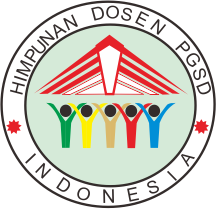INCREASING LEARNING MOTIVATION AND LEARNING OUTCOMES IN MATHEMATICS USING MODULES FOR ELEMENTARY SCHOOL STUDENTS
DOI:
https://doi.org/10.30595/dinamika.v14i1.11541Keywords:
modules, mathematics, learning motivation and learning outcomes, elementary schoolAbstract
Abstract. This study aims to look at the use of modules to improve learning motivation and learning outcomes in mathematics for elementary schools. Modules are a source of learning in learning activities. Modules can be either manual or e-modules. The type of data used is secondary data. The method used in this research is the literature study method. The data obtained were compiled, analyzed, and concluded in to get conclusions about the literature study. Based on the research results of literature studies from several research results and books and journal articles, it shows that: (1) the use of modules can increase student motivation. (2) the use of modules can improve student learning outcomes.
Â
Â
Â
Â
References
[1] Somayasa, W dkk (2013). Pengembangan Modul Matematika Realistik Disertai Asesmen Otentik Untuk Meningkatkan Hasil Belajar Matematika Peserta Didik Kelas X Di Smk Negeri 3 Singarajae-Journal Program Pascasarjana Universitas Pendidikan Ganesha Program Studi Penelitian dan Evaluasi Pendidikan (Volume 3 Tahun 2013)
[2] Haryanto, E. (2019). Upaya Meningkatkan Rasa Ingin Tahu Dan Prestasi Belajar Matematika Materi Sifat-Sifat Bangun Ruang Melalui Model Pembelajaran Van Hiele Di Kelas V Sd Muhammadiyah 04 Comal. Dinamika Jurnal Ilmiah Pendidikan Dasar, 9(2).
[3] Sudaryono, S., & Aryani, I. K. (2021). School Policy in Improving Discipline Character of Elementary School Students. Dinamika Jurnal Ilmiah Pendidikan Dasar, 13(2), 101-103.
[4] Ariyanti, A., & Hermita, N. (2020). The Effect of Scaffolding-Based Problem-Based Learning Approaches to Improve Mathematical Modelling Ability of Elementary School Students. Dinamika Jurnal Ilmiah Pendidikan Dasar, 12(1), 1- 14.
[5] Kurniati, A (2016) . Pengembangan Modul Matematika Berbasis Kontekstual Terintegrasi Ilmu Keislaman.AlKhwarizmi : Jurnal Pendidikan Matematika dan Ilmu Pengetahuan Alam, p-ISSN: 2337-7666 and e-ISSN: 2541-6499
[6] Bowen, G. A. (2009). Document Analysis as a Qualitative Research Method. Qualitative research journal.
[7] Prihantana, M. A. S., Santyasa, I. W., & Warpala, I. W. S. (2014). Pengembangan Bahan Ajar Interaktif Berbasis Pendidikan Karakter Pada Mata Pelajaran Animasi Stop Motion untuk Siswa SMK. Jurnal Teknologi Pembelajaran Indonesia, 4(1).
[8] Stacey, K. (2012). The international assessment of mathematical literacy: PISA 2012 Framework and items. Selected Regular Lectures from the 12th International Congress on Mathematical Education, pp. 771–790. https://doi.org/10.1007/978-3-319-17187-6_43
[9] Ibrahim, D. S, Suardiman , S. P( 2014). Pengaruh Penggunaan E-Learning Terhadap Motivasi Dan Prestasi Belajar Matematika Siswa Sd Negeri Tahunan Yogyakarta. jurnal Prima Edukasia, Volume 2 - Nomor 1, 2014
[10] Amanda, N., Reffiane, F., & Arisyanto, P. (2019). Pengembangan Media Budel (Buku Berjendela) pada Tema Keluargaku. Jurnal Penelitian dan Pengembangan Pendidikan, 3(2), 97-104.
[11] Barlia, L. (2010). Elementary School Teachers’ Personality In Students’ Learning Motivation To Understand Concept Of Science. Cakrawala Pendidikan. Vol. 29 (1) 14-26
[12] Baidi (2019). The Role of Parents’ Interests and Attitudes in Motivating Them to Homeschool Their Children. Journal of Social Studies Education Research. Vol. 10 (1), 156-177
[13] Nahdliyah, N, Mutala’liah (2018) Pengembangan Bahan Ajar Modul Ilmu Pengetahuan Alam bagi Siswa Kelas Iv Sekolah Dasar.
[14] Djamarah, Syaiful Bahri dan Aswan Zain. 2010. Strategi Belajar Mengajar. Jakarta: Rineka Cipta.
[15] Usman, uzer.2010. Menjadi Guru Profesional. Bandung.CV Wacana Putra
[16] Syahrowiyah, Titin. Pengaruh Metode Pembelajaran Praktik Terhadap Motivasi Dan Hasil Belajar Pendidikan Agama Islam Siswa Kelas Iv Sekolah Dasar. Studia Didaktika, [S.L.], V. 10, N. 02, P. 1 - 18, Dec. 2016. Issn 1978-8169.
[17] Arsyillah, B. T., & Muhid, A. (2020). Pendidikan Multikultural Dalam Membentuk Karakter Pemuda di Perguruan Tinggi. Al-Fikr: Jurnal Pendidikan Islam, 6(1), 17-26.
[18] Rulyansah, A, Sholihati, M (2018). Pengembangan Modul Berbasis Kecakapan Hidup Pada Pelajaran Matematika Sekolah Dasar. MUST: Journal of Mathematics Education, Science and Technology Vol 3, No. 2, Desember 2018 Hal 194 – 211
[19] Prayogo, G. R. (2021). Pengembangan Modul Matematika Bangun Datar Berbasis Contextual Teaching and Learning untuk Meningkatkan Prestasi Belajar Matematika. Kognisi : Jurnal Penelitian Pendidikan Sekolah Dasar, 1(1), 8–14
[20] Abadi, M. K., Pujiastuti, H., & Assaat, L. D. (2017, February). Development of Teaching Materials Based Interactive Scientific Approach Towards the Concept of Social Arithmetic for Junior High School Student. In Journal of Physics: Conference Series (Vol. 812, No. 1, p. 012015). IOP Publishing.
[21] Kwartolo, Y. (2010). Teknologi informasi dan komunikasi dalam proses pembelajaran. Jurnal Pendidikan Penabur, 14(Juni), 15–43
Additional Files
Published
How to Cite
Issue
Section
License
Authors who publish with this journal agree to the following terms:
Authors retain copyright and grant the journal right of first publication with the work simultaneously licensed under a Creative Commons Attribution License that allows others to share the work with an acknowledgement of the work's authorship and initial publication in this journal.
Authors are able to enter into separate, additional contractual arrangements for the non-exclusive distribution of the journal's published version of the work (e.g., post it to an institutional repository or publish it in a book), with an acknowledgement of its initial publication in this journal.
Authors are permitted and encouraged to post their work online (e.g., in institutional repositories or on their website) prior to and during the submission process, as it can lead to productive exchanges, as well as earlier and greater citation of published work (See The Effect of Open Access).

Dinamika Jurnal Ilmiah Pendidikan Dasar is licensed under a Creative Commons Attribution 4.0 International License.














